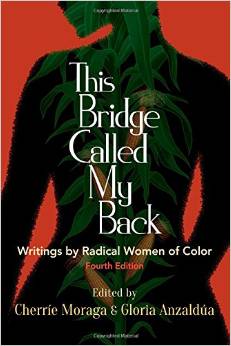
Originally released in 1981, This Bridge Called My Back is a testimony to women of color feminism as it emerged
in the last quarter of the twentieth century. Through personal essays, criticism, interviews, testimonials, poetry,
and visual art, the collection explores, as coeditor Cherríe Moraga writes, “the complex confluence of identities—race,
class, gender, and sexuality—systemic to women of color oppression and liberation.”
Reissued here, nearly thirty-five years after its inception, the fourth edition contains an extensive new introduction by
Moraga, along with a previously unpublished statement by Gloria Anzaldúa. The new edition also includes visual artists
whose work was produced during the same period as Bridge, including Betye Saar, Ana Mendieta, and Yolanda López, as well
as current contributor biographies. Bridge continues to reflect an evolving definition of feminism, one that can effectively
adapt to, and help inform an understanding of the changing economic and social conditions of women of color in the United States
and throughout the world.
“Immense is my admiration for the ongoing dialogue and discourse on feminism, Indigenous feminism, the defining discussions
in women of color movements and the broader movement. I have loved this book for thirty years, and am so pleased we have
returned with our stories, words, and attributes to the growing and resilient movement.” — Winona LaDuke (Anishinaabe),
Executive Director, Honor the Earth
Quotes and thoughts while reading:
I don't know where to start, other than to say that this is not a distillation, this is not cork-board pastings, attempting
to shoehorn these writings into digestible quotes. This book is much much more than anything that I write on this page.
With that said, below are parts to help myself remember, points that struck me.
"The danger lies in ranking the oppressions. The danger lies in failing to acknowledge the specificity of the oppression. ...
"[One] must, first, emotionally come to terms with what it feels like to be a victim... if anyone were to truly do this,
it would be impossible to discount the oppression of other, except by again forgetting how we have been hurt. " (p 24)
"Shikataganai: the attitude of resigned acceptance. " (p 34)
"I read the funniest line in a health book yesterday It said, that for some "unknown" reason, more black people had
hypertension than white people Not funny No mystery " (p 65)
A point that comes up over, and over again (for good reason, this isn't me patronizing) is how Third World women are
constantly required to educate non-oppressed groups about oppression. It is not the responsibility of Third World
women to do this, it is the responsibility of privileged groups to learn about the oppression. "I am weary of starting
from scratch each time I speak or write, as if there were no history behind us...". The history is there, and the
privileged groups should read it, instead of feigning ignorance. (p 68)
"If you are what you eat,
you become what you speak.
Free your tongue and your spirit will follow.
Free your spirit, no telling what could happen."
(p 110)
" a friend was teaching John Steinbeck's The Grapes of Wrath , to a class who had a decent number of Black students
in it and the Black students refused to believe that it was about white people... What it shows is the class conflict, the
class division, that is totally enforced in this society to keep people unaware of each other's situation, commonalities, etc." (p 115)
"Dial a Token: It's saying, "Hey, I know what you're doing and I want to get paid for it." (p 124) When Third World women are
invited to talks only to be the only black person there, to speak for all Black feminists, for the entire race, and to over
all be exploited.
"We are still measuring each other by the yardstick of the White, Capitalist, Imperialist, Racist American Patriarch. We are
still seeing radical differences when they don't exist and not seeing them when they are critical. And most disastrously,
we are failing to recognize much of what we share.
I very much liked Speaking in Tongues and In Search of the Self as Hero as well as La Prieta .
I'll have to go back and re-read them.
"We must perform visible and public acts that may make us more vulnerable to the very oppression we are fighting against. But our
vulnerability can be the source of our power - if we use it" (p 195)
The Welder by Moraga was a great piece. I'm sure you can find it online, but I thought it was really poignant, and spoke
to the power that we all have. We simply need to "pick up the torch".
"It's like technology, which is purely masculine, material, and all about aggressive-conquering power, has taken itself to the
point of sleeping on the self-destruct button and now it's as if the mother goddess is coming in and saying, "Wait a minute son,
hold it boy. Now there are other things; there is life, I've allowed you to play with your death machines long enough. Now be
quiet, cool down, I have to clean the situation up." (p 223)
"Complacency is a far more dangerous attitude than outrage." (p 166)
© JKloor 2015 Books
